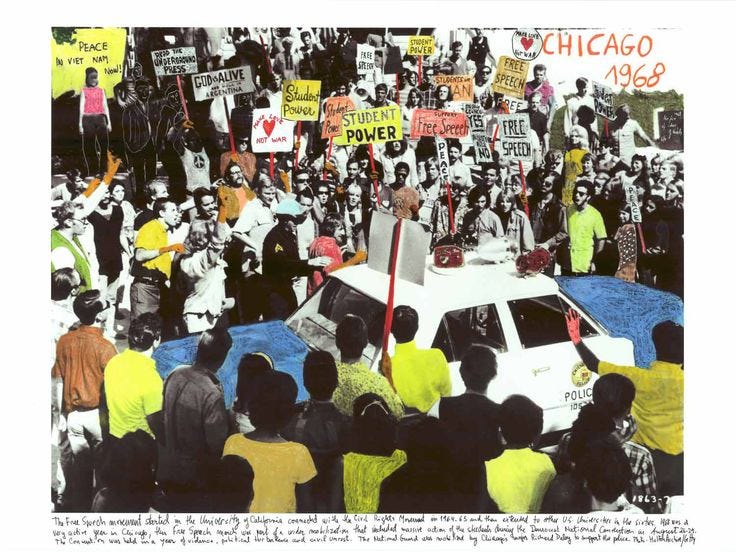The Fire of Ideas- Chicago by Marcelo Brodsky
The first amendment is one of the crucial pillars of American democracy, allowing for transfer of information and opinion as well as for dissent against popular (or unpopular) political ideologies and policies. Public discussion as well as public dissent and the ability to protest are mainstays of democratic nations around the world. The alarm bells have been ringing for us in the U.S. as we have seen certain media outlets being excluded from access to the executive branch, seen broad re-framing (or re-writing) of many current and historical issues, seen a surge in the banning of books from public libraries, and seen the suppression of free speech within academic institutions.
The free speech movement of the 1960s was a university student-lead movement in the wake of the Civil Rights Movement that fought for full constitutional rights on campus, namely freedom of speech (Cohen, 2024). University of California requirements in 1964 stated that:
A campus group ‘may not be affiliated with any partisan, political, or religious groups, nor have as one of its purposes the taking of positions with reference to the off-campus political, religious, economic, international or other issues of the time’ (Finan, 2007).
Fueled by student and faculty protests and acts of civil disobedience at Berkeley, the university changed course in just a matter of months, voting 7-1 to revoke previous restrictions. The free speech movement has had a lasting impact on the university landscape across the country, and today we see the continuation of this tradition of accelerating political movements, enacting civil disobedience, and providing a spectacle for the national and international media of public dissent on campuses across the country. We have seen mass protests on college campuses over the last decades during the Vietnam War, South African Apartheid, The Black Lives Matter movement, and more- each with varying degrees of political backlash, police violence, illegal arrests, and calls for suppression that infringed upon the protestors’ freedom of expression.
Ongoing student protests on university campuses since winter of 2023 have mainly centered around issues of justice and the cessation of violence against the Palestinian people by the Israeli government and have been publicly demonized by universities and law enforcement, as well as by the Trump administration. Thousands of students across the country have been arrested for their participation in these protests and encampments. The administration is using the Alien Enemies Act of 1798 and the Immigration and Nationality Act of 1952 to deport people without due process (Bustillo, 2025; Rose & Florido, 2025). Mahmoud Khalil is one student targeted for his role in pro-Palestinian protests and encampment at Columbia University. A recent memo by Marco Rubio officially outlined the reason for his arrest and intended deportation as his role in “antisemitic protests and disruptive activities (Rose & Florido, 2025).” Other students have been detained with pending deportation under similar circumstances. This attack on free speech on college campuses has this newer element of government targeting non-citizens so as to make it more difficult to seek due process regarding deportation, presumably to make an example of them. This is part of a broader attack on higher education, especially Ivy League schools, which Trump’s administration has accused of being sources of liberal indoctrination as well as antisemitism, despite many Jewish students' participation in the protests and encampments. Columbia University has complied with pressure from the Trump administration to crack down on eliminating masks and requiring identification during protests, allowing university police to make arrests, expelling and revoking degrees of students who participated in the of occupation Hamilton Hall in April 2024, and requiring that any Middle Eastern course have to have special review and approval from university leadership (Najjar, 2025). Harvard has so far resisted similar demands despite federal grants currently withheld.
With the onslaught of executive orders and public sentiment targeting free speech in the last 100 days, the alarm bells can feel overwhelming. Social media such as Meta platforms and X are utilizing their own forms of free speech suppression. It is during this time that we have to be diligent about letting folks know that we have views that are not aligned with the current administration’s policies that support extreme violence and cruelty. In an environment where we are aware that it would be prudent to say less, we need to be speaking out loud and clear that our beliefs and the moral imperatives they represent are not something to fall by the wayside. I believe we can expect that the young Americans who care so deeply about these issues will continue to protest and exercise their rights to free speech across the political spectrum. A visible statement of dissent, such as in physical protest en masse, brings to the forefront the oppositional views that can change the public conversation and perception of important national and international issues.
References:
Bustillo, X. (2025, April 29). Trump wants to bypass immigration courts. experts warn it’s a “slippery slope.” NPR. https://www.npr.org/2025/04/29/g-s1-63187/trump-courts-immigration-judges-due-process
Cohen, R. (2024, October 8). Teaching about the Berkeley Free Speech Movement: Civil Disobedience and mass protest in the 1960’s (part 1). NYU Steinhardt. https://steinhardt.nyu.edu/metrocenter/teaching-about-berkeley-free-speech-movement-civil-disobedience-and-mass-protest-1960s
Finan, C. M. (2007). From the palmer raids to the patriot act: A history of the fight for free speech in america. Beacon Press.
Najjar, F. (2025, March 22). How Columbia gave in to Trump’s demands to get its $400m funding back. Al Jazeera. https://www.aljazeera.com/news/2025/3/22/how-columbia-gave-in-to-trumps-demands-to-get-its-400m-funding-back
Rose, J., & Florido, A. (2025, April 10). Trump administration lays out its evidence for deporting activist Mahmoud Khalil. NPR. https://www.npr.org/2025/04/10/nx-s1-5356481/mahmoud-khalil-dhs-evidence-detained-palestinian-protests-columbia-antisemitism
Singh, M. (2025, March 30). Why Trump’s brutal crackdown on free speech is unprecedented in the US. The Guardian. https://www.theguardian.com/us-news/2025/mar/30/trump-crackdown-free-speech
Additionally:
Artwork used above- Marcelo Brodsky- 1968: The Fire of Ideas
Jacobin- Trump Promised Free Speech and Delivered the Opposite



